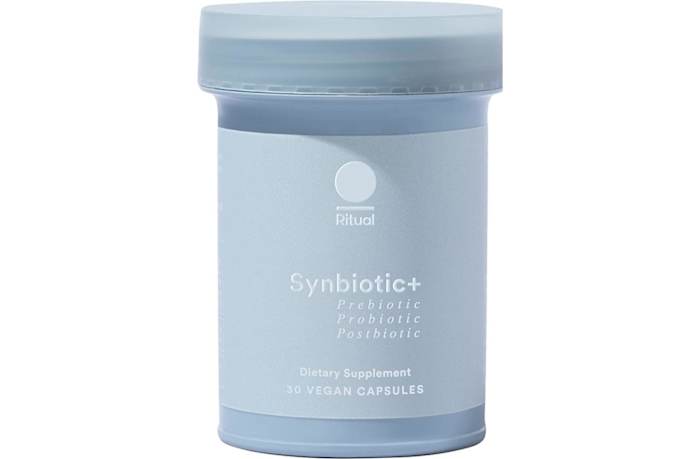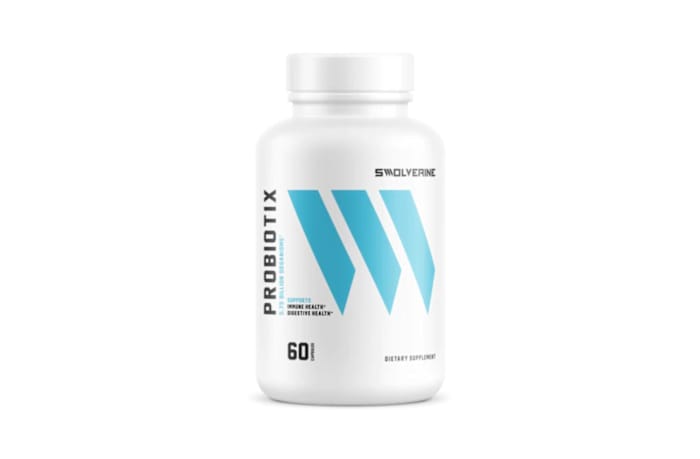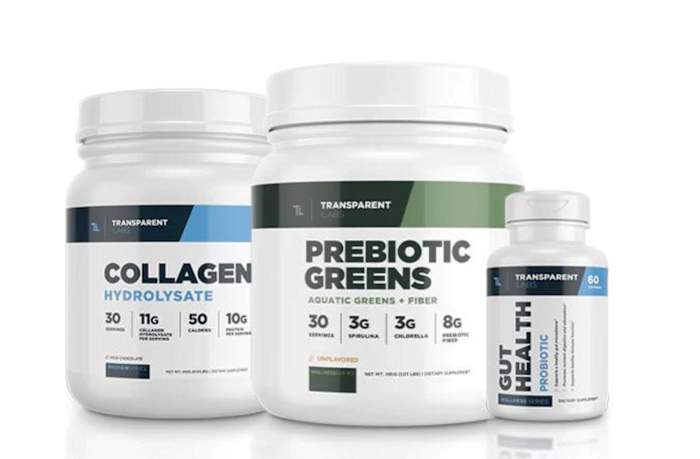The products featured in this article have been independently reviewed. When you buy something through the retail links on this page, we may earn commission at no cost to you, the reader. Sports Illustrated editorial staff are not involved in the creation of this content. Learn more here.
Gut health has been a huge topic in the wellness community over the past ten years, and for good reason. The gastrointestinal system serves as the body's communication center, processing essential nutrients for healthy function. A 2019 survey found that 35.4 million visits to doctors' offices and eight million visits to emergency departments resulted in a digestive disease diagnosis, and that doesn't include those who deal with gastrointestinal issues on a daily basis. Currently, there is no diagnosis for an unhealthy gut, but there is significant evidence that maintaining a healthy gut is an important factor in overall health.
Prebiotics and probiotics are found in multivitamins and foods and play a role in gut health. In the next sections, we’ll break down the potential benefits of a prebiotic vs. probiotic, some signs that suggest your digestive tract could benefit from them, foods and supplements they are in, who needs prebiotics and probiotics and who they are not suitable for.
Benefits of Prebiotics and Probiotics
Prebiotics
Prebiotics serve as a food source for microorganisms in your gut. These microorganisms break down prebiotics to create short-chain fatty acids (SCFAs). From there, SCFAs improve gut health by promoting the growth of beneficial bacteria like probiotics. Other benefits associated with prebiotics are improved mineral absorption and better immune response, and there is evidence that prebiotics feed probiotics so they can grow and support metabolic health.
A 2014 study by the Department of Psychiatry and the University of Oxford links taking prebiotics and mental health. This study states that participants who took a prebiotic produced less cortisol, the hormone associated with stress, which suggests prebiotics can improve mental health.
Related Post: What Is A Prebiotic? Benefits, Effects, and Contributions to Gut Health
Probiotics
Probiotics work to maintain a healthy balance of bacteria in your body. According to Harvard Medical School (HMS), probiotics improve immune function and digestion, protect against bad bacteria and support the absorption of food and nutrients. A balanced microbiome means that the good bacteria outnumber the bad bacteria and can create a barrier against other harmful bacteria.
The National Institute of Health (NIH) states there is evidence that probiotics can help manage symptoms of gastrointestinal conditions such as inflammatory bowel disease (IBD). Additionally, a 2014 study published by the National Library of Medicine found that participants who took a probiotic supplement lost more body weight and fat mass over twelve weeks than the group given a placebo.
While there is significant evidence that supports the benefits of prebiotics and probiotics, additional research is needed to fully understand the effects.
Related Post: The Top Benefits of Probiotics for Women
How Do You Know If Your Gut Needs Prebiotics and Probiotics?
It’s hard to determine whether or not your gut needs prebiotics and probiotics without consulting a healthcare professional or conducting specialized tests. Based on the previously mentioned benefits of prebiotics and probiotics, some symptoms that may suggest you could benefit from them are:
- Regular gastrointestinal issues such as gas, bloating, constipation or diarrhea
- Signs of a weakened immune system
- Lack of energy or fatigue
- Diet is lacking essential nutrients and insoluble fiber
These symptoms could be caused by many other factors and prebiotics and probiotics should not substitute medical care. This is meant as a general guide for symptoms that could suggest you may benefit from prebiotics and probiotics. Always consult your healthcare provider to address any symptoms or health concerns.
Who Needs Prebiotics and Probiotics the Most?
Those who have taken antibiotics recently could benefit from biotic supplementation because these prescriptions reduce gut microbiota diversity. If you are trying to support your immune system and digestion, prebiotics and probiotics from a trusted vitamin brand could help.
Prebiotics and probiotics are also found in foods, and those who do not follow a balanced diet could benefit from incorporating these foods. The next section details prebiotic and probiotic-rich foods.
Prebiotic foods
There are many different kinds of prebiotics, but the most common are found in foods that are a source of resistant starches inulin and pectin. When resistant starches are broken down butyrate is produced, which helps with immune function and electrolyte absorption and reduces inflammation. Foods with inulin help you feel full, maintain good gut bacteria and support healthy bowel movements. Pectin can support the health of the skin cells in the intestinal lining, decreasing the ability of bad bacteria to put down roots. Foods that include these prebiotic fibers are:
- Resistant starches: potatoes, barley, plantains, legumes, rice, oats
- Inulin: asparagus, chicory root, onions, garlic, leeks, soybeans, yams, Jerusalem artichoke
- Pectin: apples, potatoes, green beans, peaches, apricots, raspberries, carrots, tomatoes
Related Post: The Best Prebiotic Foods to Support Digestion
Probiotic foods
Most foods that contain probiotics are fermented and should have “live and active cultures” mentioned on the food label. Here are some suggestions:
- Fermented pickles or sauerkraut
- Yogurt
- Miso soup
- Cottage cheese
- Sourdough bread
- Kimchi
- Kombucha
- Kefir
- Tempeh
It is important to note that food processing, cooking and digestion may affect the likelihood of prebiotics and probiotics reaching your digestive tract. A high-quality supplement that’s been shown to survive the journey may increase the likelihood, but there is no guarantee.
Who Should Not Take Prebiotics and Probiotics?
Those with compromised immune systems, allergies, certain medical conditions or those who recently had surgery should avoid or exercise caution when taking prebiotics and probiotics. Always talk to your doctor before starting any supplement.
Our Favorite Prebiotic and Probiotic Supplements
Ritual Synbiotic+
Get 25% off your first month of Ritual! Code: SI25
Ritual Synbiotic+ is a prebiotic, probiotic and postbiotic with a delayed-release capsule designed to dissolve once it reaches the intestinal tract. In addition to the benefits prebiotics and probiotics can have, Synbiotic+ has postbiotics that provide energy to cells in the digestive tract to support gut bacteria and the immune system. It’s made with traceable ingredients, and the sources for each are detailed on the Ritual website.
Check out our Ritual Synbiotic+ review for more information.
Swolverine Probiotix
Swolverine Probiotix has 5.75 billion CFUs (colony forming units) of Lactobacillus and Bifidobacterium, both of which are types of bacteria involved in a multitude of clinical studies. Swolverine also conducted a third-party clinical trial that found the participants who took Bacillus subtilis daily, a strain included in Probiotix, reported more regularity and less gastrointestinal discomfort. Probiotix is free from GMOs, gluten and soy, and Swolverine has a subscription option that offers 15% savings.
Check out our Swolverine Probiotix review for more information on this probiotic supplement.
Transparent Labs Gut Essentials Stack
The Gut Essentials Stack by Transparent Labs is a triad of collagen, greens with prebiotics and the brand’s Gut Health probiotic supplement. Collagen contains glycine, which can promote good bacteria growth and support gut health. The prebiotic greens powder contains three grams of organic acacia fiber, organic green banana flour and one gram of Jerusalem artichoke fiber which are all slow fermenting fibers.
The Gut Health probiotic has 100 billion CFUs of lactobacilli, bifidobacteria and streptococci, three of the seven core genera of microbial organisms. Each supplement is gluten-free and does not contain any artificial preservatives or sweeteners.
To learn more about the brand, check out our Transparent Labs Review.
Prebiotic vs Probiotic FAQs
Should you take a probiotic every day?
Evidence shows that taking probiotics daily can improve gut health and digestion; however, more research is needed to determine the benefits. Always talk to your doctor before starting new supplements or making big changes in your diet.
Related Post: Should I Take Probiotics Every Day?
Should I take a prebiotic or probiotic for weight loss?
Research suggests that probiotics may reduce fat mass and prebiotics support metabolic health, which can lead to weight loss, but there is not enough evidence for a clear-cut answer. The CDC states that weight loss is achieved through a lifestyle that maintains healthy eating patterns, regular exercise and stress management.
Related Post: The Best Probiotics for Weight Loss
What time of day should you take prebiotics?
We asked Certified Sports Nutrition Coach expert Pete Nastasi and he states, "I would personally recommend taking a probiotic supplement somewhere in between lunch and dinner. I would recommend taking it at least one hour after eating and at least one hour before your next meal. As long as you can fall within that window, it's gonna have a really good chance of making it past through your stomach and actually into your gut."
Do prebiotics reduce inflammation?
When foods with resistant starches, a source of prebiotics, are broken down butyrate is produced which helps reduce inflammation.
Should you take prebiotics without probiotics?
You can take them separately, but consuming them together could be more beneficial because prebiotics can promote the growth of probiotics in the gut.
Final Thoughts
Gut health plays an important role in overall health and an unbalanced gut could lead to other health conditions. Evidence shows that taking prebiotics and probiotics could be beneficial by promoting the growth of beneficial bacteria, improving mineral absorption and immune function, and reducing symptoms of gastrointestinal conditions like irritable bowel syndrome (IBS). Prebiotics and probiotics can be consumed from fermented foods and fiber-rich foods, or from trusted supplement brands with high-quality ingredients and transparent labels. More research is needed to determine all the benefits and the side effects of taking probiotics and prebiotics, and we recommend consulting your primary care doctor before starting new supplements or making big changes in your diet.
Prices are accurate and items in stock as of publish time.














